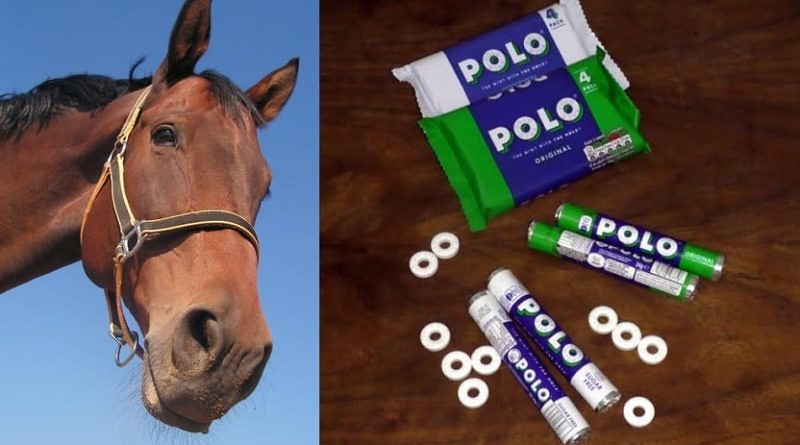Artificial sweeteners in Polo mints: cancer risk or cancer cure?
Many horses enjoy Polo mints as a treat, but the sugar found in normal Polos might be a worry for owners of laminitics. So what about the sugar-free kind? Many owners are very health conscious and worry that something containing “artificial sweeteners” might carry long-term health risks for their horse.
Today’s post is intended to shed some light on this topic. What sweeteners do sugar-free Polos actually contain? And can they pose a threat to the long term health of your horse?
I will preface this by saying that this had never particularly worried me. Until someone confronted me about the sweetener in sugar-free Polos specifically, the only research I had done into the ingredients was to make sure that nothing in the mints would be toxic to horses or be a colic risk in modest quantities. Satisfied that everything was safe, it didn’t really cross my mind that the sweetener specifically might cause any long-term side-effects and be of particular concern.
What I didn’t really take into account is that there’s a very widely held belief that artificial sweeteners carry a health risk – especially with respect to cancer.
The first thing to realise is that there isn’t just one ‘artificial sweetener’. There are many different types and it doesn’t really make sense to generalise about them (other than that they taste sweet!). Arguably the most controversial sweetener, and the subject of the majority of scare stories, is aspartame, a common ingredient in diet drinks. The sweetener found in sugar-free Polo mints, on the other hand, is sorbitol. A scientific comparison of these two sweeteners tells us that they are worlds apart both in terms of their origins and their chemistry.
Sorbitol is found naturally in a number of different fruits and vegetables including apples, pears and peaches. But just because it is found naturally doesn’t mean it is guaranteed to be safe! There are countless substances found in nature that are very obviously poisonous or toxic, and the most common allergens, for example, are definitely natural!
But as far as horses consuming sorbitol, if you’ve ever given your horse apples, they’ve had sorbitol before. In fact some feed companies use sorbitol to make feed more appealing for insulin-resistant horses without the issues associated with sugar.
Of course these facts alone don’t mean sorbitol is safe for horses when consumed over a long period. But equally, there doesn’t appear to be any reason to believe that there would be a long-term risk. So what do we actually know about the effects of consuming sorbitol?
Side-effects
There’s nothing particularly mysterious about sorbitol and its side-effects. The most notable consequence of consuming too much sorbitol is diarrhea (though less powerful than the maltitol in Haribo’s infamous sugar free gummy bears). Other than that there doesn’t seem to be much to worry about. In fact, in the UK there is no recommended upper limit for sorbitol consumption. This is in contrast to, for instance, aspartame, which does come with a recommended daily limit. But even for aspartame the limit is quite high: for the average adult it’s the equivalent of about 20 cans of diet drink daily!
Cancer
The main issue people seem to have with artificial sweeteners is a belief that they increase the likelihood of cancers. And, like everything these days, sorbitol has been researched with respect to cancer. But the results might surprise you! Rather than being considered a cancer risk, sorbitol has actually been shown to have anti-cancer properties in multiple types of cancer. So this is a definitely not a good reason to avoid sugar-free Polos. If anything, the sorbitol in them might even be a positive! Of course, sugar-free Polo mints themselves are not likely to cure cancer, but it seems they are more likely to be a help than to be any kind of risk.
So why do people think that artificial sweeteners are so bad for you? Well, the culprit appears to be the controversial aspartame. Back in the 1990s the idea that aspartame was linked to brain cancer gained widespread media attention. This came about thanks to a man called John Olney who published an article provocatively titled Increasing brain tumor rates: Is there a link to aspartame? Of course the media picked up on this and pushed the idea that a rise in brain cancer coincided with the approval of aspartame into the food chain.
Not long after a chain email by one “Nancy Markle” was passed around that claimed aspartame was tied to a plethora of medical conditions. According to an article in Time magazine:
A widely disseminated e-mail by a “Nancy Markle” links aspartame to Alzheimer’s, birth defects, brain cancer, diabetes, Gulf War syndrome, lupus, multiple sclerosis and seizures.
This hoax email was notorious enough to become the subject of a Snopes debunking.
Olney never did check whether the people who had developed cancer in his dataset were also consuming aspartame. As his contemporary noted, it would have been just as appropriate to invoke the advent of home computers, increasing VCR usage or the depletion of the ozone layer as explanations for the increased rate in brain tumours that was being observed at the time. In fact, the increase in brain tumours coincided so perfectly with aspartame that aspartame couldn’t be to blame. Remember these are long-term effects we are supposed to be talking about!
In any case, correlation does not imply causation (you can try finding your own meaningless correlations here!) and the claims concerning aspartame and brain tumours have since been refuted. In fact, aspartame is now one of the most rigorously tested food ingredients and has been studied extensively with no indication that it isn’t safe.
But with all the early controversy, many people still ended up with the idea that aspartame was somehow bad for you. But remember, the sweetener we were discussing isn’t even aspartame! It is sorbitol – an entirely different molecule with a different origin and different possible effects.
The Chemistry
So what is sorbitol exactly? Put simply, sorbitol is something called a ‘sugar alcohol’.
A sugar is a molecule consisting of a specific configuration of carbon, hydrogen and oxygen atoms. One of the most important sugars is glucose which has the formula C6H12O6 . Glucose is our source of energy and is absolutely fundamental to respiration. Without glucose, you and I would not be alive. It is found everywhere in nature but when isolated ‘artificially’, it typically comes from corn, which, like other plants, stores glucose as starch.
To make sorbitol, glucose is reduced. Reduction is simply the name for the process where an -OH group is formed in the molecule by making some changes to its configuration and adding some hydrogen atoms, giving it the new formula C6H14O6. This -OH group is what defines an ‘alcohol’. Thus making sorbitol a ‘sugar alcohol’.
Sugar alcohols can be made ‘artificially’ or they can be found in nature. The molecules are the same regardless of their origin.
Why use Polos anyway?
There are only a handful of different types of treats that seem to be almost universally appreciated by horses and one of those is Polo mints. Perhaps it’s also something to do with the fact I used to eat a lot of them myself, but the little mints are a staple feature of my pockets.
They are not the most nutritious treat. But there are a lot of things I like about Polos:
- Almost all horses learn to like them or have had them before
- Contain no common allergens and are safe for children and other animals
- Not messy or crumbly
- Conveniently packaged in tubes
- Decent size but easily broken in half if I want a smaller treat
- Easy to keep track of how many I’ve given
- Relatively cheap
- Bonus – they give you (and your horse!) a minty fresh breath!
The sugar-free variety in particular, is something I use for rewarding laminitis-prone horses when they are not keen on alternatives.
When giving any treats to horses, moderation is always important to avoid digestive issues. But there is really no reason to think the small quantities of sorbitol found in sugar-free Polo mints would be a long-term health risk. So whether you give them to your pony or like to have some yourself, sugar-free Polos are a great treat for those of us trying to avoid sugar.







